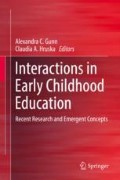Abstract
The study of human development and learning in the West has broadened its focus across the twentieth century from a position that largely privileged the individual human subject as separated from the world and effected by its influences, to one where human subjectivity and the world are mutually constitutive; where experience is mediated by cultural tools; and through which over time, we can see the expansion of human learning and activity as interdependent (Bronfenbrenner and Ceci 1994; Rogoff 2003; Vygotsky 1978). It is no longer possible or desirable to view people as separate from culture and to ignore the reciprocal influences of people and culture. This is a major factor in why studies into interactions between children and their worlds are of growing interest to researchers, educators and policy makers alike. In the context of early childhood education in New Zealand for instance, we see this in the view of children as increasingly capable of and competent to direct their own learning as they draw from and shape what happens in the early childhood service (Ministry of Education 2004/2009). Concurrently, formal learning theories have expanded across the late twentieth century to account more clearly for the ways interactions between people, places, and things within an education setting invite and sustain learning (for example, the shift from individual cognitive constructivism to social-constructivism, and social-situated views of learning and associated theories like for instance, community of practice, (Snyder and Wenger 2010)). From a sociocultural perspective learning experiences lead developmental growth and change; communication between people, in deliberately planned places, with particular things is of paramount importance to learning. As educators in early childhood education have begun to take up these ideas with more vigour around the world understanding interactions and the learning that comes from them is of growing importance. Hence the critical need for research and scholarship into learning interactions and educational practice in the early years.
Access this chapter
Tax calculation will be finalised at checkout
Purchases are for personal use only
Notes
- 1.
Marae are places of communal cultural and social significance within Māori society encompassing a physical place (land) with buildings that belong to specific iwi or hapū (tribe or sub-tribe).
References
Aries, P., Asch, T., Carpenter, E., Crawford, S., Forge, A., Gombrich, E. et al. (2011). Video, film and photographs as research documents. In M. W. Bauer & G. Gaskell (Eds). Qualitative researching with text, image and sound. Online: Sage Research Methods.
Bandura, A. (1977). Self-efficacy: Toward a unifying theory of behavioural change. Psychological Review, 84(2), 191–215.
Bronfenbrenner, U., & Ceci, S. J. (1994). Nature-nurture reconceptualised in developmental perspective: A bioecological model. Psychological Review, 101(4), 568–586.
Carroll-Lind, J., & Angus, J. (2011). Through their lens: An inquiry into non parental education and care of infants and toddlers. Wellington: Office of the Children’s Commissioner.
Dalli, C. (2003). Learning in the social environment: Cameos from two children’s experiences of starting childcare. European Early Childhood Education Research Monograph. Themed Monograph Series No., 1, 87–98.
Dalli, C., White, J., Rockel, J., Duhn, I., with Buchanan, E., Davidson, S., Ganly, S., Kus, L., & Wang, B. (2011). Quality early childhood education for under-two-year-olds: what should it look like? A literature review (Chapter 2). Ministry of Education. Wellington. Retrieved from http://www.educationcounts.govt.nz/publications/ece
König, A. (2006). Dialogisch-entwickelnde Interaktionsprozesse zwischen ErzieherIn und Kind(ern). Eine Videostudie aus dem Alltag des Kindergartens. Inaugural dissertation. Dortmund. https://eldorado.tu-dortmund.de/bitstream/2003/24563/1/Diss_veroeff.pdf [22.07.2015].
Maier, S. F., & Seligman, M. E. (1976). Learned helplessness: Theory and evidence. Journal of Experimental Psychology, 105(1), 3–46.
Ministry of Education. (2004/2009). Kei tua o te pae, assessment for learning: Early childhood exemplars. Wellington: Author.
Mitchell, L., Wylie, C., & Carr M. (2008). Outcomes of early childhood education: Literature Review Report to the Ministry of Education. Retrieved from http://www.nzcer.org.nz/system/files/885_Outcomes.pdf
National Scientific Council on the Developing Child. (2007). The science of early childhood development: Closing the gap between what we know and what we do. Retrieved from http://www.developingchild.net
Rogoff, B. (2003). The cultural nature of human development. New York: Oxford University Press.
Shonkoff, J., & Phillips, D. (2000). From neurons to neighborhoods. Washington, DC: National Academy Press.
Siraj-Blathford, I., Sylva, K., Muttock, S., Gilden, R. * Bell, D. (2002). Researching effective pedagogy in the early years. DFES research report RR356. London: Queen’s Printer.
Siraj-Blathford, I. (2009). Conceptualising progression in the pedagogy of play and sustained shared thinking in early childhood education: A Vygotskian perspective. Wollongong, AUS: University of Woolongong, Research Online.
Smith, A. B. (2015). Can home-based care offer high quality early childhood education? NZ Journal of Education Studies, 50, 71–85.
Snyder, W. M., & Wenger, E. (2010). Our world as a learning system: A communities-of-practice approach. In C. Blackmore (Ed.), Social learning systems and communities of practice (pp. 107–124). London: Springer-Verlag & The Open University Press LTD.
Tomaselo, M. (2008). Origins of human communication. Cambridge MA/London: MIT Press.
Viernickel, S., & Stenger, U. (2010). Didaktische Schlüssel in der Arbeit mit null- bis dreijährigen Kindern. In D. Kasüschke (Ed.), Didaktik in der Pädagogik der frühen Kindheit (pp. 175–198). Kronach: Carl Link.
Vygotsky, L. S. (1978). In M. Cole, V. John-Steiner, S. Scribner, & E. Souberman (Eds.), Mind in society: The development of higher psychological processes. Cambridge, MA: Harvard University Press.
Author information
Authors and Affiliations
Corresponding author
Editor information
Editors and Affiliations
Rights and permissions
Copyright information
© 2017 Springer Nature Singapore Pte Ltd.
About this chapter
Cite this chapter
Gunn, A.C. (2017). Using Insights from Interactions Research to Improve Policy and Practice in Early Childhood Education. In: Gunn, A., Hruska, C. (eds) Interactions in Early Childhood Education. Springer, Singapore. https://doi.org/10.1007/978-981-10-4879-1_12
Download citation
DOI: https://doi.org/10.1007/978-981-10-4879-1_12
Published:
Publisher Name: Springer, Singapore
Print ISBN: 978-981-10-4878-4
Online ISBN: 978-981-10-4879-1
eBook Packages: EducationEducation (R0)

